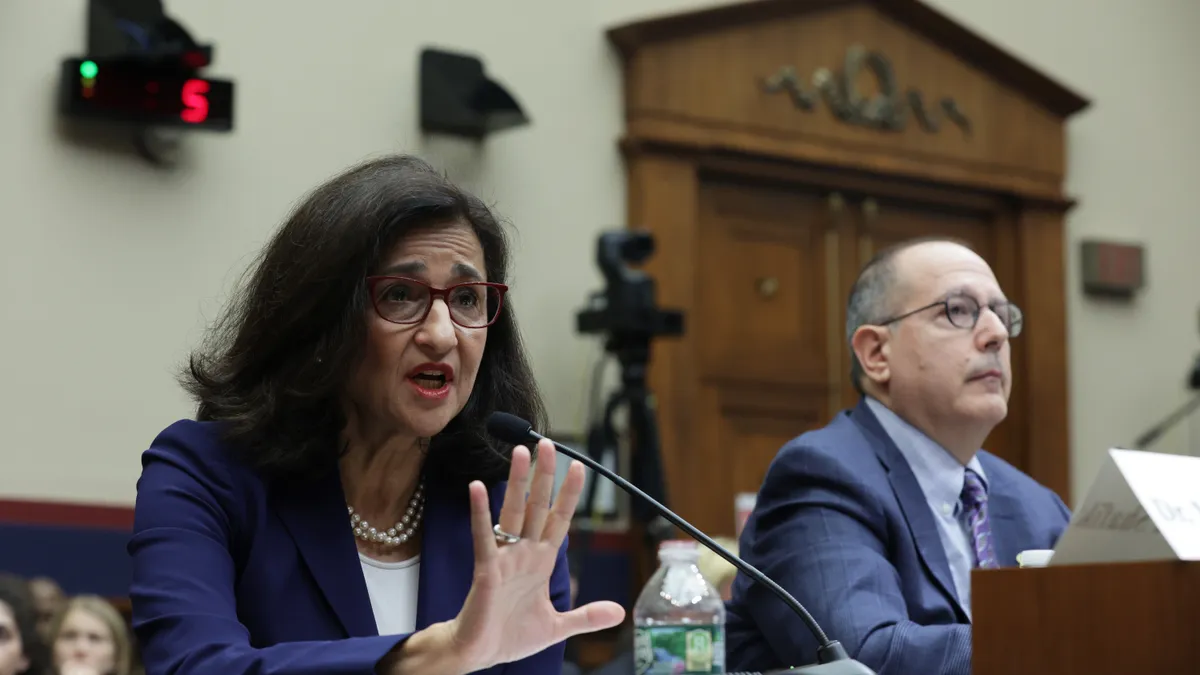Dive Brief:
- The House education committee continued its inquiry into antisemitism at colleges Wednesday as Republicans grilled leaders from Columbia University.
- Minouche Shafik, president of Columbia, along with other university officials, testified in front of the House Committee on Education and the Workforce for almost four hours on what the Ivy League institution is doing to address an increase in antisemitic acts.
- Republicans heavily criticized Columbia for failing to react to antisemitism on its campus and attacked the university's disciplinary methods for faculty and students who violated its harassment policies as too weak.
Dive Insight:
Wednesday's hearing was the latest in a series of congressional probes into antisemitism on college campuses following the Oct. 7 Hamas attack on Israel and the escalation of the ongoing Israel-Hamas war.
Colleges have long been home to student activism and protests, but they are increasingly grappling with the challenge of balancing free speech rights and disciplining harassment in the wake of the Middle East situation.
The Hamas attack resulted in about 1,200 deaths, and the militant group, labeled as a terrorist organization by the U.S. government, continues to hold some 100 Israeli hostages. Israel retaliated with airstrikes and ground assaults on Gaza, where the death toll has reached at least 34,000, according to the Palestinian Ministry of Health.
In December, the House education committee grilled three leaders from other highly selective colleges — Claudine Gay of Harvard University, Elizabeth Magill of the University of Pennsylvania, and Sally Kornbluth of the Massachusetts Institute of Technology — on their institutions' antisemitism and free speech policies. In the aftermath of their remarks, both Gay and Magill were forced out of their roles.
The committee had originally called Shafik to testify along with the trio, but she declined, citing scheduling conflicts.
Since that hearing, colleges, including Columbia, have continued to see rising tensions and unauthorized demonstrations on campus.
House lawmakers finally got the chance to address Shafik directly on Wednesday, along with two of the university's trustees and David Schizer, a law professor at Columbia who is co-chair of its task force on combating antisemitism.
"Columbia administrators have repeatedly failed in their duty to protect Jewish students from this hateful, retrograde form of discrimination," Virginia Foxx, the North Carolina Republican who chairs the committee, said in her opening statement. "We have seen far too little, far too late done to counter that and protect students and staff."
Leading up to the hearing, colleges across the country ramped up disciplinary actions against student protesters.
For example, Columbia suspended and evicted six students from university housing for their alleged involvement in an unauthorized event. The university lifted sanctions against two of the students shortly afterward, according to the Columbia Daily Spectator, its student newspaper.
Shafik said on Wednesday the administration took action, in part, because the students declined to participate in the university's investigation.
Still, Republicans on the committee criticized not just student protesters but some members of Columbia faculty.
Shafik confirmed the university fired at least one faculty member over comments he made about Israel and said the professor could never be rehired.
“I am very personally committed to making sure that our faculty do not cross the line, in terms of discrimination and harassment," said Shafik, who has led the university for less than a year. “Many of these appointments were made in the past, in a different era, and that era is done."
However, Rep. Elise Stefanik, a Republican from New York, blasted the university for not immediately dismissing a handful of faculty she said had expressed blatantly antisemitic and anti-Jewish sentiments. Written warnings are not enough, she said.
"Do you see the concern that speaking to these professors is not enough, and it’s sending a message across the university that this is tolerated?” Stefanik asked, before cedeing her time.
Through the hearing, Shafik emphasized that Columbia strengthened both its harassment disciplinary policies and their enforcement.
Republican lawmakers maintained a combative tone throughout the hearing, often visibly frustrated when Shafik declined to answer with a yes or no as to whether phrases like "from the river to the sea" are antisemitic.
At the heart of the tension is how academics and lawmakers define antisemitism.
Columbia's antisemitism task force, for example, has faced criticism for not setting a clear definition of what constitutes antisemitism. The dispute arises in part because of conflicting definitions from beyond the campus.
The Anti-Defamation League considers support of the state of Israel inherent to the Jewish identity, and thus calls attacks on the nation antisemitic. The International Holocaust Remembrance Alliance, however, has said criticism of Israel is not regarded as antisemitic if it is "similar to that leveled against any other country."
During the hearing, Schizer defined antisemitism more directly than his task force had previously.
"It's bias against Jewish people, which can manifest as ethnic slurs, stereotyping, Holocaust denial, double standards as applies to Israel, and antisemitic tropes," he said.
Both Stefanik and Rep. Ilhan Omar, a Democrat from Minnesota, asked Shafik if a recent anti-Israel protest at Columbia was inherently anti-Jewish. But Shafik sidestepped.
“The protest was not labeled as an anti-Jewish protest. It was labeled as an anti-Israel government and policy protest,” Shafik said, through Stefanik's attempts to cut her off. “But antisemitic things were said."
Schizer said Columbia's task force is expected to issue a report on combating antisemitism next month.















